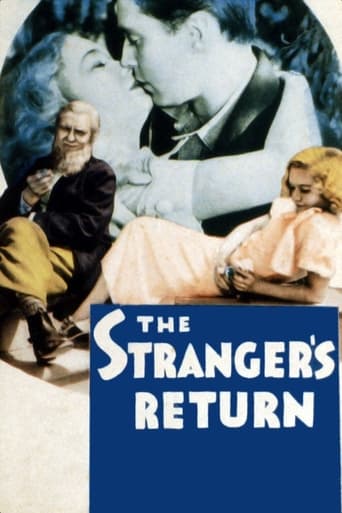marcslope
A King Vidor Metro production, but it sure smells like 20th Century Fox, with its rural setting, leisurely pacing, and prosaic dialog--it's even based on a novel by, and co-screenwritten by, Phil Stong, who wrote 20th's "State Fair." Lionel Barrymore, wearing a fake beard that wouldn't fool an eight-year-old, is the patriarch of a successful Iowa farm, a Civil War vet (just barely--at 85, he'd have been 17 in 1865) saddled with a troublesome family he lives with, including a wonderful Beulah Bondi, as a calculating shrew. Granddaughter Miriam Hopkins, a divorcée, comes to visit from New York and falls in love with both the farm and married neighbor Franchot Tone, while hired hand Stu Erwin drinks and provides the modest comic relief. The writing's less than first-rate- -scenes just end, and there's more detail to the workings of farm life than necessary--but it's a quiet, touching character study, and Hopkins, often given to histrionics elsewhere, is restrained and appealing. The characters' dilemmas feel real, and the bittersweet ending resonates.
bkoganbing
The stranger in The Stranger's Return is Miriam Hopkins who newly divorced visits grandfather Lionel Barrymore's farm. While there she falls for the neighboring farmer Franchot Tone who is just slightly married to Irene Hervey. Therein lies the story.Barrymore is his usual cantankerous self who has survived most of his relatives including his own children and spouse. There's a whole lot of grasping relatives who'd like a piece of his considerable estate including that farm.This film really belongs to Lionel Barrymore who is going on all eight cylinders of curmudgeonliness. For once Franchot Tone is not in formal dress though he and Hopkins seem to lack a certain chemistry.I'd watch this for Barrymore.
csteidler
Lionel Barrymore is wonderful as 85-year-old Grandpa Storr, crotchety old patriarch who's spent his life running the old family farm. Miriam Hopkins is equally enchanting as the granddaughter who arrives from the city to stay. Hopkins and Barrymore are just delightful as they strike up a fast friendship. "You know, I have a feeling you aren't quite as bad as you're painted," Hopkins offers in a charming early scene where the pair get acquainted sitting on a porch swing. "Who said I was bad?" Barrymore growls back—with a mischievous smirk and slightly raised eyebrow. Stuart Erwin is excellent as Grandpa's devoted if melancholy farm hand. And Franchot Tone is just right as the educated neighbor farmer, loyal to his family and farm although he is powerfully attracted by Hopkins' charm and sophistication and misses the university where he really should be teaching. Funny and poignant, the picture is full of endearing moments and simple yet memorable episodes. The threshing day lunch, for example—when a farmer at the crowded dinner table asks Hopkins for one more piece of pie, the result is hilarious and unforgettable.
thegreggor-1
A very quiet story in terms of action, but full of wonderful performances in material that could have been easily dull in the wrong hands. Miriam Hopkins is at her most beautiful in her prime. When she's on the screen,you simply can't miss her star appeal, which is absolutely magnetic. Not only a beauty, but she proves herself again to be a great actress with a dynamic range. (Also see Dr. Jeckyl and Mr. Hyde 1932, Trouble In Paradise, Story Of Temple Drake,and Becky Sharp for Miriam at her best.) Beulah Bondi offers great support with her character that you will love to hate. Lionel Barrymore is also quite lovable in his role as the elderly patriarch of the family.Don't see this film when you're high energy, but see this film.


